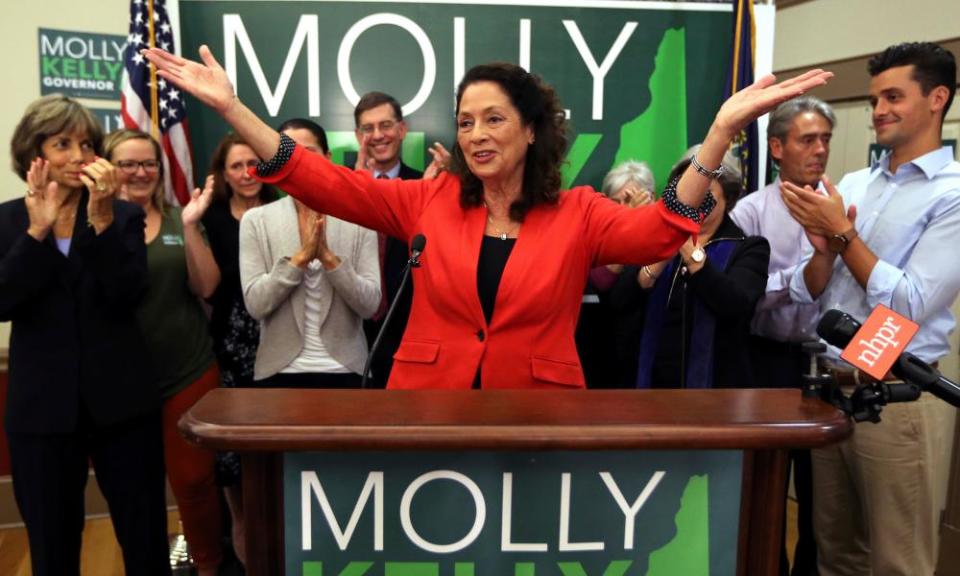New Hampshire win makes Molly Kelly 15th woman nominated by major US party
Kelly to face governor Sununu as Chris Pappas beats 11 contenders, including son of Bernie Sanders, to become Democratic nominee for congress

Democrat Molly Kelly, a former state senator, has won the Democratic nomination for New Hampshire governor, setting up a November showdown with the popular Republican incumbent, Chris Sununu.
With her victory on Tuesday, Kelly becomes the 15th woman nominated by a major party for governor this primary season – a record. The previous high was set in 1994, when the parties nominated 10 women gubernatorial nominees.
Democrats have nominated 11 women so far and Republicans four.
“Don’t underestimate me,” Kelly said at her victory party in remarks directed at Sununu.
Kelly said she had been underestimated before. As a single mother, she raised three children while working to put herself through college. She then went on to defeat the Republican leader in the state Senate, where she served for a decade.
Sununu was elected to a first two-year term in 2016, wresting the governorship from Democrats after 12 years in power. Now they want the seat back. But Kelly faces an uphill battle in the famously purple state: he is among the most popular governors in the country.
On Tuesday Kelly, a former five-term state senator, defeated former Portsmouth Mayor Steve Marchand, who cast himself as the more progressive candidate in the race. Kelly emphasized her track record on education, women’s rights and gun safety.
In New Hampshire’s 1st congressional district, executive councillor Chris Pappas won the Democratic nomination in an 11-way primary that included Bernie Sanders’ son, Levi Sanders.
Pappas, one of two frontrunners in the crowded primary, fended off a vigorous challenge from former Obama administration official Maura Sullivan, in a key race to replace retiring Democratic congresswoman Carol Shea-Porter.
Levi Sanders, who lives outside the district, was poised to finish in the middle of the pack on Tuesday night with less than 2% of the overall vote. The Vermont senator, who routed Hillary Clinton by 22 points in New Hampshire during the 2016 primary, did not endorse his son.
Pappas, a local party favorite who is serving his third term on the governor’s Executive Council, would make history as the state’s first openly gay representative in Congress if he is elected in November. He was outraised and outspent by Sullivan, a former marine who was dogged by criticism that she was an outsider who had moved to the state only to run for office.
Pappas will face Republican Eddie Edwards, a former police chief who would be the first African-American to represent the state in Congress. Edwards emerged from a nasty primary battle to clinch the nomination over state senator Andy Sanborn. Trump carried the district in 2016 and Republicans hope to target it in November.
New Hampshire is the beginning of the end of primary season, which started six months ago in Texas and will concludes this week with Rhode Island on Wednesday and New York on Thursday.
Both states are playing host to closely watched Democratic gubernatorial primaries.
In Rhode Island, governor Gina Raimondo is facing a strong challenge from the left by secretary of state Matt Brown. Raimondo has blue-chip endorsements from national Democrats, like Joe Biden, while Brown has the backing of the progressive group Justice Democrats.
In New York, governor Andrew Cuomo is also facing a progressive challenge from actress-turned-political activists Cynthia Nixon.
The races will cap a primary season that has seen Democrats nominate progressives, women and people of color.

